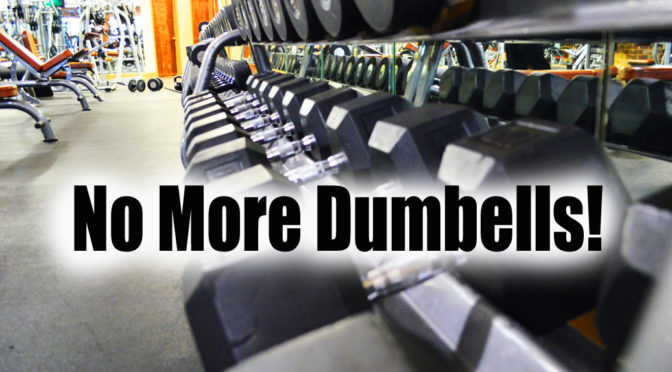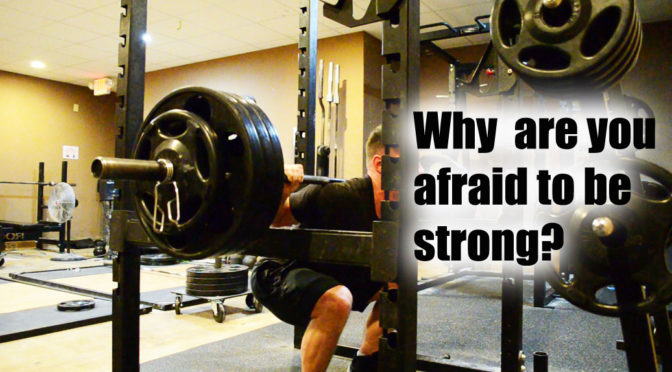A Case Against Dumbells
The title of this post is actually a bit of a paradox for me as in many ways I am actually a big fan of dumbells for certain things. I was very fond of dumbells during my college years. The dumbell bench press and dumbell shoulder press were staples of my routine for probably 10 years or so.
I used dumbells to great effect to build some pretty impressive shoulders as well as rehabbing those shoulders from various injuries I sustained thru bmx riding over the years. While I am very fond of dumbells due to a few favorable experiences with them, I would have trained differently had I known what I know now.
Everyone has read about the various upsides of dumbells, they let you isolate a muscle better, they can increase the range of motion in exercises like the bench press, they allow you to work the bicep thru it’s fullest range of motion which includes supination which can not be achieved using a barbell, and they are pretty easily found in most gyms. There are even whole workout plans and books out there devoted only to dumbell training. We’ve all seen articles in bodybuilding magazines where some huge guy advocates using dumbell bench press as his primary chest exercise, and hell I even followed that myself for a very long time and I was happy with the results-at the time.
There is however a very dark side to dumbells.
It’s actually not that dark of a side, so far there have been no studies released (yet) that link dumbell use to colon cancer or something else terrible but the best way to put it is that dumbells are not the most effective tools for you to base a training program around.
Dumbell exercises should not make up the bulk of your training ever! They can be acceptable if you absolutely have no other option. They are better then sitting on the couch anyday.
Why is this? What is wrong with dumbells?
The main reason that dumbell exercises should not make up the bulk of your training is actually very simple, they are not scale-able. Unlike the main barbell exercises, the squat, bench press, overhead press, and deadlift, dumbell versions of these exercises can not be scaled up for a very long time. You can always add weight to the bar in the main barbell exercises but the point of diminishing returns and risk of injury arrives very quickly with dumbells.
Any guy who has progressed past the 100 pound dumbells for bench or shoulder presses starts to see this very quickly. How exactly are you going to safely get 120 pound dumbells into position for the bench press? Have you ever seen this procedure before? It either involves multiple people to help steady and hold the dumbells in place and then spot them, or it involves some half ass dumbell power clean, to box squat position then you have to lay down, under control backwards holding 240 pounds in your hands. All this is before you have even done a rep yet. And then what happens when your done? How do you set down in a safe and controlled manner two dumbells that were almost too heavy to pick up in the first place? Have you ever seen someone get “out of the groove” when doing heavy dumbell bench presses? Imagine dropping that 120 pound dumbell square onto your face.
At some point dumbells heavy enough to effectively create a training stimulus become extremely difficult to handle safely. Here in lies the next problem, if we are substituting dumbells for major barbell exercises, how exactly are we going to create an effective training stimulus while at the same time minimizing our risk of injury? Lets just say you’re a bodybuilder (a natural one) with a 300 pound max bench press, your best weight to stimulate the most muscle growth is about 75% of that, that roughly works out to about 225 pounds. We will probably have to round down and we get 110 pound dumbells needed to create an effective training response. The problem just gets worse if we decide focus more on strength.
Even if you can handle those 110 pound dumbells, how exactly are you going to increase weight from week to week? Most dumbells only come in 5 pound increments, but lots of research has shown that for upper body lifts, gains of 5 pounds per week are too high to sustain for long. Most dumbells that big aren’t modular, so we cannot use micro plates to make smaller jumps in weight as we do with the barbell. So what are we left with? Adding more reps, more sets? At some point you will reach a point of diminishing returns and you wont have the time or recovery ability to do enough volume with those weights to create a training response.
Do we even have to cover the two biggest lifts-the squat and deadlift and talk about how useless dumbells are for those? The limiting factor for weight used for either of those variations is your grip, or your arms. How exactly are you going to do goblet squats with a weight heavy enough to create a strength stimulus? If you think front squats are awkward to hold in the racked position try doing the goblet squat with a 100 pound dumbell. Split Squats or lunges become problematic as well. Even when using straps to take your grip out of the equation, you will still get to a point where getting into the proper position for these exercises with a heavy enough weight puts you in a very awkward and potentially dangerous situation.
Dumbells definitely do have a place in your gym bag, just not as your primary exercise. Dumbells are better suited for lighter exercises after the muscles have been pre-fatigued by a large compound movement. They can effectively be used to rehab an injury when the range of motion is so limited that a barbell cannot be used. Even then the point is to get back to a real barbell as soon as possible and continue the rehab. The problem with all the exercises that actually work well with dumbells is that none of them utilize a large enough amount of muscle mass or exhibit significant progress potential to warrant using them as a primary training movement. Those exercises are what they call accessory movements and you just can not base an effective program around them.
Despite all of this it isn’t impossible to see significant gains using only dumbells for certain exercises. I found the seated dumbell shoulder press to be a very good exercise back in my college years. I also thought I had great success with regular and incline dumbell bench press. I didn’t actually get to compare though so its possible I made shitty progress and didn’t even know it. I did eventually hit a plateau training that way and it is a 100% certainty that using the barbell bench press and overhead press as my staples during that time would have increased my progress dramatically.


